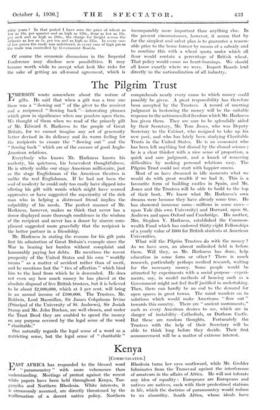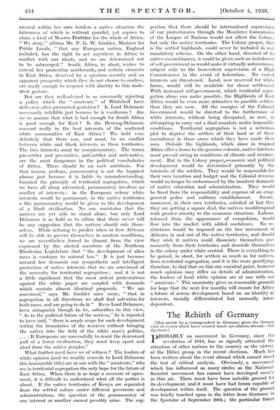Kenya
EAST AFRICA has responded to the blessed word " paramountcy " with more vehemence than understanding. Meetings of protest against • the recent white papers have been held throughout Kenya, Tan- ganyika and Northern Rhodesia. White interests, it is erroneously assumed, are directly threatened by the reaffirmation of a decent native policy. Northern
Rhodesia turns her eyes southward, while Mr. Grobler fulminates from the Transvaal against the interference of amateurs in the affairs of Africa. He will not tolerate any idea of equality : Europeans are Europeans and natives are natives, each with their predestined stations in life, which the doctrine of paramountcy would reduce to an absurdity.. South Africa, whose ideals have created within her own borders a native situation the bitterness of which is without parallel, yet aspires to claim a kind of Monroe Doctrine for the whole of Africa. "We deny," affirms Mr. P. G. W. Grobler, Minister for Public Lands, "that any European nation, England included, has the right to act anywhere in Africa in conflict with our ideals, and we are determined not to be submerged." South Africa, in short, wishes to extend her protection northwards, and certain elements in East Africa, deceived by a specious security and an apparent prosperity which they do not choose to analyse, are ready enough to respond with alacrity to this mala- droit gesture.
But are they well-advised in so summarily rejecting a policy which the " amateurs " of Whitehall have delivered after protracted gestation ? Is Lord Delamere necessarily infallible just because he is vociferous ? Are we to assume that what is bad enough for South Africa is good enough for East ? Is the Hertzog-Delamere concord really in the best interests of the scattered white communities of East Africa ? We hold very definitely that there can, and must, be no conflict between white and black interests in these territories. The two interests must be complementary. The terms pro-settler and pro-native, anti-settler and anti-native, are the most dangerous in the political vocabularies of Africa. There should be no such antithesis. For that reason, perhaps, paramountcy is not the happiest phrase just because it is liable to misunderstanding. Granted the principle of territorial segregation, which we have all along advocated, paramountcy involves no conflict of interests : in the European colony white interests would be paramount, in the native territories a like paramountcy would be given to the development of a black civilization. No one maintains that the natives are yet able to stand alone, but only Lord Delamere is so bold as to affirm that there never will be any suggestion that the natives should rule them- selves. While refusing to predict when or how Africans will be able to govern themselves in modern conditions, we are nevertheless forced to dissent from the view expressed by the elected members of the Northern Rhodesian Legislature that "the development of alien races is contrary to natural law." It is just because natural law demands our sympathetic and intelligent protection of native interests that we are convinced of the necessity for territorial segregation ; and it is not a little significant that the most ardent protestations against the white paper are coupled with demands which contain almost identical proposals. "We are convinced," says Mr. Grobler once more, "that in segregation in all direction's we shall find salvation for both races, and are going to do it." Even Lord Delamere, keen antagonist though he be, subscribes to this view. "As to the political future of the natives," he is reported to have said, "there is ample scope for such development within the boundaries of the reserves without bringing the native into the field of the white man's politics. . . . If Europeans are successfully to resist the downward pull of a lower civilization, they must keep apart and aloof from the native peoples."
What further need have we of witness ? The leaders of white opinion (and we readily concede to Lord Delamere this honourable title) are at one with the" amateurs," who see in territorial segregation the only hope for the future of East Africa. When there is so large a measure of agree- ment, it is difficult to understand what all the pother is about. If the native territories of Kenya are separated from the settled colony under different governors and administrations, the question of the paramountcy of one interest or another cannot possibly arise. The sug-
gestion that there should be international supervision of our protectorates through the Mandates Commission of the League of Nations would not affect the Colony, but only the native territories. The Colony proper, that is the settled highlands, could never be included in any mandatory scheme. On the other hand, divested of its native encumbrances, it could be given such an in.stalment of self-government as would make it virtually autonomous, subject only to the benevolent supervision of a High Commissioner in the event of federation. No vested interests are threatened. Land, now reserved for white farms, would still be available for closer settlement With increased self-government, which territorial segre- gation alone can make possible, the Highlands of East Africa would be even more attractive to possible settlers than they are now. All the energies of the Colonial Government would be directed to the furtherance of white interests, without being dissipated, as now, in attempting to carry out a dual mandate under impossible conditions. Territorial segregation is not a nefarious plot to deprive the settlers of their land or of their ascendancy in those areas which they have made their own. Outside the highlands, which alone in tropical Africa offer a home to the genuine colonist, native interests must prevail owing to conditions of climate and environ- ment. But in the Colony proper, economic and political development would be determined primarily by the interests of the settlers. They would be responsible for their own taxation and budget and the Colonial revenue would no longer be embarrassed by the insistent demands of native education and administration. They would be freed from the responsibility and expense of an exag-
gerated police and military establishment. Secure, moreover, in their own territories, satisfied at last that they are getting a square deal, the natives would respond with greater alacrity to the economic situation. Labour, released from the appearance of compulsion, would flow into the market with added confidence. No re- strictions would be imposed on the free movement of Africans in and out of the native territories, and should they wish it natives could dissociate themselves per- manently from their territories and domicile themselves in the colony under white control. There is everything to be gained, in short, for settlers as much as for natives, from territorial segregation, and it is the more gratifying, therefore, to find that on this one essential point, however much opinions may differ on details of administration, the leaders of local white opinion are at one with our "amateurs." This unanimity gives us reasonable grounds for hope that the next few months will ensure for Africa a future of serene development based on an identity 01. interests, racially differentiated but mutually inter- dependent.





















































 Previous page
Previous page